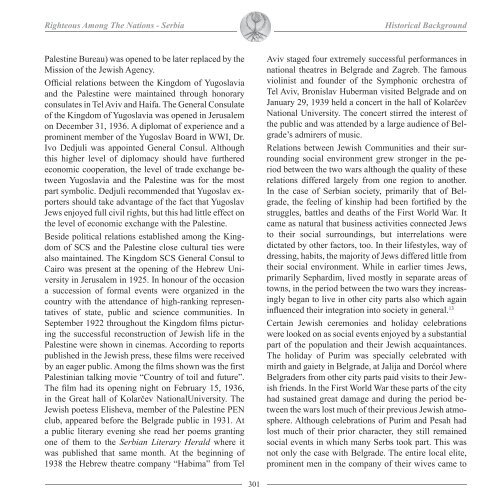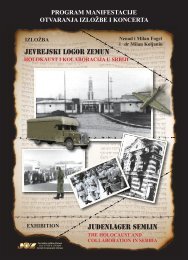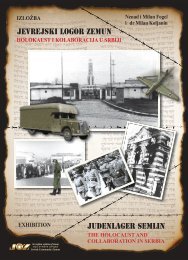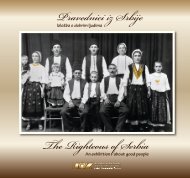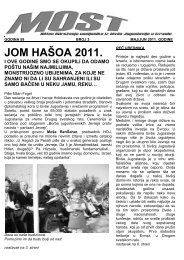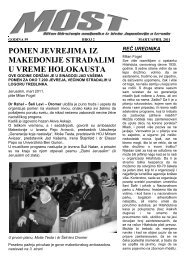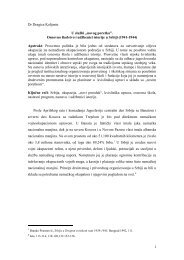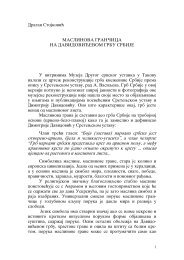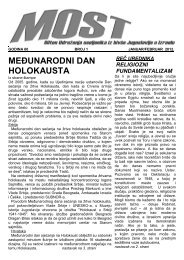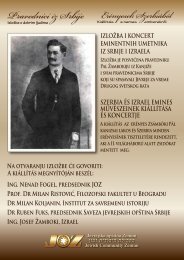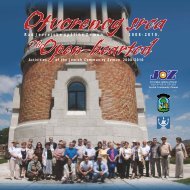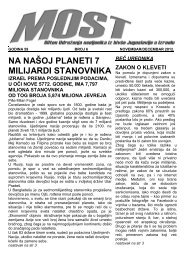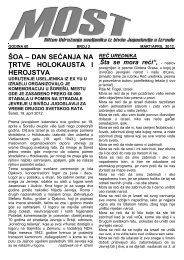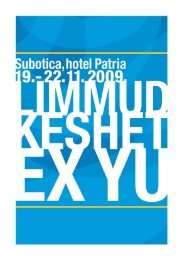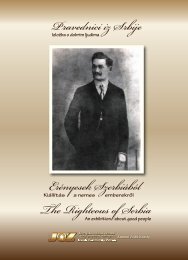Book on the Righteous - Jevrejska opština Zemun
Book on the Righteous - Jevrejska opština Zemun
Book on the Righteous - Jevrejska opština Zemun
Create successful ePaper yourself
Turn your PDF publications into a flip-book with our unique Google optimized e-Paper software.
<strong>Righteous</strong> Am<strong>on</strong>g The Nati<strong>on</strong>s - Serbia<br />
Historical Background<br />
Palestine Bureau) was opened to be later replaced by <strong>the</strong><br />
Missi<strong>on</strong> of <strong>the</strong> Jewish Agency.<br />
Official relati<strong>on</strong>s between <strong>the</strong> Kingdom of Yugoslavia<br />
and <strong>the</strong> Palestine were maintained through h<strong>on</strong>orary<br />
c<strong>on</strong>sulates in Tel Aviv and Haifa. The General C<strong>on</strong>sulate<br />
of <strong>the</strong> Kingdom of Yugoslavia was opened in Jerusalem<br />
<strong>on</strong> December 31, 1936. A diplomat of experience and a<br />
prominent member of <strong>the</strong> Yugoslav Board in WWI, Dr.<br />
Ivo Dedjuli was appointed General C<strong>on</strong>sul. Although<br />
this higher level of diplomacy should have fur<strong>the</strong>red<br />
ec<strong>on</strong>omic cooperati<strong>on</strong>, <strong>the</strong> level of trade exchange between<br />
Yugoslavia and <strong>the</strong> Palestine was for <strong>the</strong> most<br />
part symbolic. Dedjuli recommended that Yugoslav exporters<br />
should take advantage of <strong>the</strong> fact that Yugoslav<br />
Jews enjoyed full civil rights, but this had little effect <strong>on</strong><br />
<strong>the</strong> level of ec<strong>on</strong>omic exchange with <strong>the</strong> Palestine.<br />
Beside political relati<strong>on</strong>s established am<strong>on</strong>g <strong>the</strong> Kingdom<br />
of SCS and <strong>the</strong> Palestine close cultural ties were<br />
also maintained. The Kingdom SCS General C<strong>on</strong>sul to<br />
Cairo was present at <strong>the</strong> opening of <strong>the</strong> Hebrew University<br />
in Jerusalem in 1925. In h<strong>on</strong>our of <strong>the</strong> occasi<strong>on</strong><br />
a successi<strong>on</strong> of formal events were organized in <strong>the</strong><br />
country with <strong>the</strong> attendance of high-ranking representatives<br />
of state, public and science communities. In<br />
September 1922 throughout <strong>the</strong> Kingdom films picturing<br />
<strong>the</strong> successful rec<strong>on</strong>structi<strong>on</strong> of Jewish life in <strong>the</strong><br />
Palestine were shown in cinemas. According to reports<br />
published in <strong>the</strong> Jewish press, <strong>the</strong>se films were received<br />
by an eager public. Am<strong>on</strong>g <strong>the</strong> films shown was <strong>the</strong> first<br />
Palestinian talking movie “Country of toil and future”.<br />
The film had its opening night <strong>on</strong> February 15, 1936,<br />
in <strong>the</strong> Great hall of Kolarčev Nati<strong>on</strong>alUniversity. The<br />
Jewish poetess Elisheva, member of <strong>the</strong> Palestine PEN<br />
club, appeared before <strong>the</strong> Belgrade public in 1931. At<br />
a public literary evening she read her poems granting<br />
<strong>on</strong>e of <strong>the</strong>m to <strong>the</strong> Serbian Literary Herald where it<br />
was published that same m<strong>on</strong>th. At <strong>the</strong> beginning of<br />
1938 <strong>the</strong> Hebrew <strong>the</strong>atre company “Habima” from Tel<br />
Aviv staged four extremely successful performances in<br />
nati<strong>on</strong>al <strong>the</strong>atres in Belgrade and Zagreb. The famous<br />
violinist and founder of <strong>the</strong> Symph<strong>on</strong>ic orchestra of<br />
Tel Aviv, Br<strong>on</strong>islav Huberman visited Belgrade and <strong>on</strong><br />
January 29, 1939 held a c<strong>on</strong>cert in <strong>the</strong> hall of Kolarčev<br />
Nati<strong>on</strong>al University. The c<strong>on</strong>cert stirred <strong>the</strong> interest of<br />
<strong>the</strong> public and was attended by a large audience of Belgrade’s<br />
admirers of music.<br />
Relati<strong>on</strong>s between Jewish Communities and <strong>the</strong>ir surrounding<br />
social envir<strong>on</strong>ment grew str<strong>on</strong>ger in <strong>the</strong> period<br />
between <strong>the</strong> two wars although <strong>the</strong> quality of <strong>the</strong>se<br />
relati<strong>on</strong>s differed largely from <strong>on</strong>e regi<strong>on</strong> to ano<strong>the</strong>r.<br />
In <strong>the</strong> case of Serbian society, primarily that of Belgrade,<br />
<strong>the</strong> feeling of kinship had been fortified by <strong>the</strong><br />
struggles, battles and deaths of <strong>the</strong> First World War. It<br />
came as natural that business activities c<strong>on</strong>nected Jews<br />
to <strong>the</strong>ir social surroundings, but interrelati<strong>on</strong>s were<br />
dictated by o<strong>the</strong>r factors, too. In <strong>the</strong>ir lifestyles, way of<br />
dressing, habits, <strong>the</strong> majority of Jews differed little from<br />
<strong>the</strong>ir social envir<strong>on</strong>ment. While in earlier times Jews,<br />
primarily Sephardim, lived mostly in separate areas of<br />
towns, in <strong>the</strong> period between <strong>the</strong> two wars <strong>the</strong>y increasingly<br />
began to live in o<strong>the</strong>r city parts also which again<br />
influenced <strong>the</strong>ir integrati<strong>on</strong> into society in general. 13<br />
Certain Jewish cerem<strong>on</strong>ies and holiday celebrati<strong>on</strong>s<br />
were looked <strong>on</strong> as social events enjoyed by a substantial<br />
part of <strong>the</strong> populati<strong>on</strong> and <strong>the</strong>ir Jewish acquaintances.<br />
The holiday of Purim was specially celebrated with<br />
mirth and gaiety in Belgrade, at Jalija and Dorćol where<br />
Belgraders from o<strong>the</strong>r city parts paid visits to <strong>the</strong>ir Jewish<br />
friends. In <strong>the</strong> First World War <strong>the</strong>se parts of <strong>the</strong> city<br />
had sustained great damage and during <strong>the</strong> period between<br />
<strong>the</strong> wars lost much of <strong>the</strong>ir previous Jewish atmosphere.<br />
Although celebrati<strong>on</strong>s of Purim and Pesah had<br />
lost much of <strong>the</strong>ir prior character, <strong>the</strong>y still remained<br />
social events in which many Serbs took part. This was<br />
not <strong>on</strong>ly <strong>the</strong> case with Belgrade. The entire local elite,<br />
prominent men in <strong>the</strong> company of <strong>the</strong>ir wives came to<br />
301


